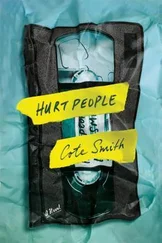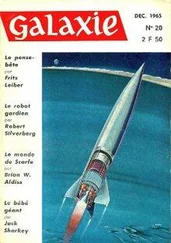Paul paid no attention to her. Eccentricities were multiplying among people these days. Being middle-aged was a matter of taste, and many human beings, after the Rediscovery of Man, found that if they let themselves become imperfect, it was a more comfortable way to live than the old way — the old way consisting of aging minds swelling in bodies condemned to the perpetual perfection of youth.
“I had flu,” said the woman. “Have you ever had flu?”
“No,” said Paul, not very much, interested.
“Are you reading a newspaper?” She looked at his newspaper, which had everything except news in it.
Paul, with the paper in front of him, admitted that he was reading it.
“Do you like coffee?” said the woman, looking at Paul’s cup of fresh coffee in front of him.
“Why would I order it if I didn’t?” said Paul brusquely, wondering how the woman had ever managed to find so unattractive a material for her dress. It was yellow sunflowers on an off-red background.
The woman was baffled, but only for a moment.
“I’m wearing a girdle,” she said. “They just came on sale last week. They’re very, very ancient, and very authentic. Now that people can be fat if they want to, girdles are the rage. They have spats for men, too. Have you bought your spats yet?”
“No,” said Paul, flatly wondering if he should leave his coffee and newspaper.
“What are you going to do about that man?”
“What man?” said Paul, politely and wearily.
“The man who’s bought the Earth.”
“Did he?” said Paul.
“Of course,” said the woman. “Now he has more power than the Instrumentality. He could do anything he wants. He can give us anything we want. If he wanted to, he could give me a thousand-year trip around the universe.”
“Are you an official?” said Paul sharply.
“No,” said the woman, taken a little aback.
“Then how do you know these things?”
“Everybody knows them. Everybody.” She spoke firmly and pursed her mouth at the end of the sentence.
“What are you going to do about this man? Rob him? Seduce him?” Paul was sardonic. He had had an unhappy love affair which he still remembered, a climb to the Abbadingo over Alpha Ralpha Boulevard which he would never repeat, and very little patience with fools who had never dared and never suffered anything.
The woman flushed with anger. “We’re all going to his hostel at twelve today. We’re going to shout and shout until he comes out. Then we’re going to form a line and make him listen to what each one of us wants.”
Paul spoke sharply: “Who organized this?”
“I don’t know. Somebody.”
Paul spoke solemnly. “You’re a human being. You have been trained. What is the Twelfth Rule?”
The woman turned a little pale but she chanted, as if by rote: “ ‘Any man or woman who finds that he or she forms and shares an unauthorized opinion with a large number of other people shall report immediately for therapy to the nearest subchief.’ But that doesn’t mean me… ?”
“You’ll be dead or scrubbed by tonight, madam. Now go away and let me read my paper.”
The woman glared at him, between anger and tears. Gradually fear came over her features. “Do you really think what I was saying is unlawful?”
“Completely,” said Paul.
She put her pudgy hands over her face and sobbed. “Sir, sir, can you — can you please help me find a sub-chief? I’m afraid I do need help. But I’ve dreamed so much, I’ve hoped so much. A man from the stars. But you’re right, sir. I don’t want to die or get blanked out. Sir, please help me!”
Moved by both impatience and compassion, Paul left his paper and his coffee. The robot waiter hurried up to remind him that he had not paid. Paul walked over to the sidewalk where there were two barrels full of money for people who wished to play the games of ancient civilization. He selected the biggest bill he could see, gave it to the waiter, waited for his change, gave the waiter a tip, received thanks, and threw the change, which was all coins into the barrel full of metal money. The woman had waited for him patiently, her blotched face sad.
When he offered her his arm, in the old-French manner, she took it. They walked a hundred meters, more or less, to a public visiphone. She half-cried, half-mumbled as she walked along beside him, with her uncomfortable, ancient spiked-heel feminine shoes:
“I used to have four hundred years. I used to be slim and beautiful. I liked to make love and I didn’t think very much about things, because I wasn’t very bright. I had had a lot of husbands. Then this change came along, and I felt useless, and I decided to be what I felt like — fat, and sloppy, and middle-aged, and bored. And I have succeeded too much, just the way two of my husbands said. And that man from the stars, he has all power. He can change things.”
Paul did not answer her, except to nod sympathetically.
At the visiphone he stood until a robot appeared. “A subchief,” he said. “Any subchief.”
The image blurred and the face of a very young man appeared. He stared earnestly and intently while Paul recited his number, grade, neonational assignment, quarters number and business. He had to state the business twice, “Criminal public opinion.”
The subchief snapped, not unpleasantly, “Come on in, then, and we’ll fix you up.”
Paul was so annoyed at the idea that he would be suspected of criminal public opinion, “any opinion shared with a large number of other people, other than material released and approved by the Instrumentality and the Earth government,” that he began to spiek his protest into the machine.
“Vocalize, man and citizen! These machines don’t carry telepathy.”
When Paul got through explaining, the youngster in uniform looked at him critically but pleasantly, saying,
“Citizen, you’ve forgotten something yourself.” “Me?” gasped Paul. “I’ve done nothing. This woman just sat down beside me and—”
“Citizen,” said the subchief, “What is the last half of the Fifth Rule for All Men?”
Paul thought a moment and then answered, “The services of every person shall be available, without delay and without charge, to any other true human being who encounters danger or distress.” Then his own eyes widened and he said, “You want me to do this myself?”
“What do you think?” said the subchief.
“I can,” said Paul.
“Of course,” said the subchief. “You are normal. You remember the braingrips.”
Paul nodded.
The subchief waved at him and the image faded from the screen.
The woman had seen it all. She, too, was prepared. When Paul lifted his hands for the traditional hypnotic gestures, she locked her eyes upon his hands. She made the responses as they were needed. When he had brainscrubbed her right there in the open street, she shambled off down the walkway, not knowing why tears poured down her cheeks. She did not remember Paul at all.
For a moment of crazy whimsy, Paul thought of going across the city and having a look at the wonderful man from the stars. He stared around absently, thinking. His eye caught the high threat of Alpha Ralpha Boulevard, soaring unsupported across the heavens from faraway ground to the mid-height of Earthport: he remembered himself and his own personal troubles. He went back to his newspaper and a fresh cup of coffee, helping himself to money from the barrel, this time, before he entered the restaurant.
ON A YACHT OFF MEEYA MEEFLA
Ruth yawned as she sat up and looked at the ocean. She had done her best with the rich young man.
The false Rod McBan, actually a reconstructed Eleanor, said to her:
Читать дальше











